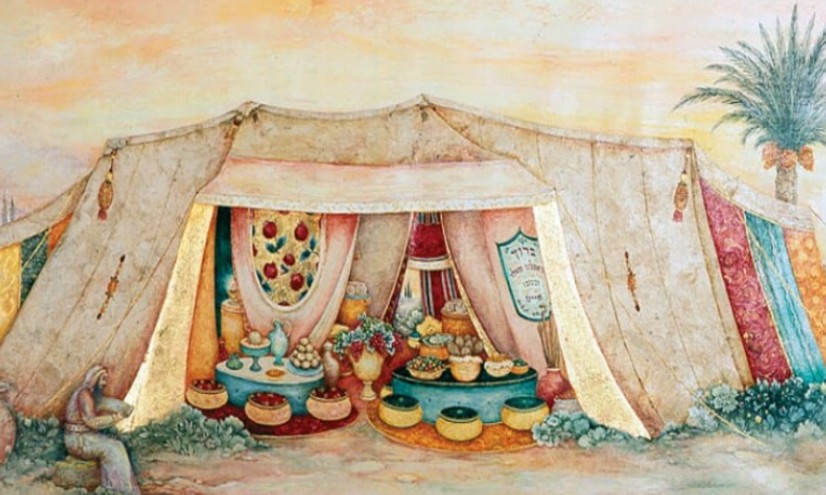
Photo by The Rabbi Sacks Legacy
Avraham Avinu encouraged many to believe in Hashem, despite the fact that avodah zarah (idolatry) was so rampant in his generation. How was he able to achieve this?
Our parashah tells us, ‘he planted an eshel in Be’er Sheva and there he proclaimed the name of Hashem, G-D of the universe’ (21:33).
Chazal (Sotah 10a) explains that he established a resting place for travelers. Some say that an eshel is an inn, others say that it is an orchard, but all agree that it was a place for these tired travelers to get some respite.
When these now satiated travelers got a chance to rest and enjoy a hearty meal, they wouldn’t leave before wanting to thank their generous host. After all, he really went out of his way to provide so many with the provisions they needed. However, Avraham exclaimed ‘don’t thank me, did you eat from my food? Really you ate from Hashem’s food; you need to thank Him!’ He taught them how really Hashem created the Universe and everything we enjoy, results from Him. In this way they would leave with the heightened awareness that everything is from Hashem and would offer praise and thanks before they left. In this manner, many left their idolatrous practices and instead believed in Hashem.
It should be noted that these guests were eager to express appreciation, and for sure wouldn’t have left before saying thank you. However, Avraham was reminding them to look beyond the surface, ‘you think I caused these beautiful trees to grow that you ate its fruit, did I create these animals from whom you partook of its meat etc. There is a Creator Who constantly sustains the world and gives life and sustenance to all beings, all benefits we have in this world result from Him so we must express our appreciation.’ This is why the verse specifies ‘Hashem G-D of the Universe’, since Avraham’s hospitality helped all the passersby become aware that Hashem is in control of every aspect of the Universe
This lesson that Avraham taught his guests is really a model for all of us. As Chazal (Berachos 58a) teaches “a good guest is one who says, ‘look how much effort the host put in taking care of me, how much meat, wine and bread he gave to me. All that trouble that he went to was only for me!” The Maharsha explains that this refers to us. We are all guests in this world and need to strive to be ‘good guests’, appreciating all the incredible good that Hashem constantly gives us. There is a tendency to take the things we are just so used to for granted, such as air, food, water etc. However, we need to try and appreciate how all these are gifts from Hashem and there are so many stages that occur to enable us to benefit from them.
For example, it is very easy to go to our local shop and purchase, let’s say, a loaf of bread, without thinking too much of it. Yet when we take a step back and contemplate, we will be mesmerised by all the many factors that went into this. For example, the sun evaporates water from the ocean and then clouds are formed. These clouds move inland and then showers all our fields with rain. This helps cause the seeds of wheat to grow. The wheat is then ground into flour and mixed with water to form dough. It is then baked and eventually reaches the shelves in the shop! What’s more, all we need to do is to pick it off the shelf and pay for it!
As Ben Zomah taught, Adam Harishon had to go through ten stages just until he was in a position to bake, such as ploughing, planting and harvesting yet we wake up and everything is available! (Berachos 58a) We can learn from Avraham to see beyond the surface and attribute every benefit that we partake from, back to Hashem.
One way we can do this is by trying to have more kavanah when we recite berachos, as we see in the following story.
One time Rabbi Yisrael Salanter was in a café in Paris with some of his students. He ordered a cup of water, but to his surprise it was an exorbitant sum. After politely asking the waiter why the price was so high, he was told ‘by drinking in this café you are not just paying for your beverage, you are paying for the comfortable and attractive furniture, exquisite paintings, the impressive cups, the relaxing music and the spectacular garden.’ Rabbi Salanter told his students that he now gained a true awareness of the ideal way to express our gratitude to Hashem. It is essential that we try to focus on all the details that were involved. For example, when we say shehakol over a cup of water, we are not only thanking Hashem for the water but for all the thousands of factors that went into its production. Water vapor is evaporated into the air and condensates causing it to come down as rain. This is collected in a reservoir and then sent to factories. The water is then distilled and purified, to be fit for drinking. It is then sent through pipes to many different locations. Then at the ease of opening a tap, we could enjoy delicious clean water wherever we are! This is also aside from the fact of the many factors that resulted in creating the cup/bottle! Each time we say the words shehacol nihyeh bidvaroh, we are expressing our appreciation for the countless factors that went into this food/beverage. How incredible!
Compiled by Daniel Shasha. To receive this by email or to subscribe to our weekly newsletter please contact us at [email protected]
